Dental Implant Care | Postoperative Instructions & Aftercare
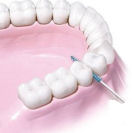
Dental Implant Care
Nobody wants complications or failure after one of the most expensive dental treatments such as dental implants. As a patient you should do everything under your control to avoid this situation. Following your dentist's instructions for the post-operative care immediately after the surgery and for their long term aftercare is the least to do for maintaining your dental implants for a life time.
In this Article:
Post-operative Instructions after Dental Implant Surgery
Following your doctor's instructions during the post-operative care period is an important factor for the success of a dental implant surgery. The most common post-operative instructions are the following:
- After the first 24 hours from surgery, it is usually recommended to rinse the mouth very gently with warm water. Your dentist or oral surgeon may suggest that you add 1/2 teaspoon of salt to a cup of warm water and rinse four or five times a day, for three to four days.
- If antibiotics or/and pain medication are prescribed, follow your dentist's post operative instructions, regarding the dosage and proper time to take your medicines. Especially for antibiotics, you should take them for as many days as directed by your dentist, don't stop earlier.
- Some bleeding is normal for 24 hours. Bleeding can be controlled by biting on a gauze pad or a moist tea bag placed directly on the bleeding wound for 30 minutes. If there is excessive bleeding or it continues beyond the second day call your dentist.
- Do not take aspirin because it may induce bleeding.
- Don't spit or suck on straws. This can dislodge blood clots and slow healing.
- Keep physical activities to a minimum for the next few days.
- Try to keep your head elevated for 24-48 hours after the surgery to minimize swelling and bleeding.
- Swelling is a normal occurrence after surgery. You may use an ice pack on the side of your face and the sides of your jaws for the first 48 hours after surgery to reduce swelling.
- You should not eat or drink hot foods for 24 hours after your surgery. Drink plenty of fluids.
- A fairly soft diet should be maintained for several months following surgery while the surgical area heals. Avoid hard or crusty foods, especially during the first part of the postoperative phase. Proper diet is an essential part of dental implant surgery aftercare.
- Avoid checking the wound with your tongue because that could irritate the surgery area.
- Do not smoke because it delays healing and increases the chance of infection.
- If you had a sinus bone graft during the placement of upper posterior implants, avoid blowing the nose during the first two weeks of the postoperative period.
- Brush and floss your teeth as usual, but avoid the surgical area and use only a little bit of water to rinse. Avoid using a Water Pik.
- Contact your implant dentist immediately if you get nausea, fever, vomiting or any sign of infection.
- You should normally visit your dentist two weeks after the dental implant surgery for suture removal and postoperative evaluation.
If you follow carefully all the post-operative instructions you can help in minimizing the risk of complications that could lead to dental implant failure.
Dental Implants Aftercare - Long term dental implant care guide
Proper aftercare of your dental implants is important for maintaining them for a life time without problems. About 12 months after the surgery the implant is fully osseointegrated into the jaw bone, but that does not mean that you do not have to take care of them any more because they are 'artificial' and not natural teeth. Dental implants require the same care as real teeth, including brushing, flossing, and regular dental check-ups.
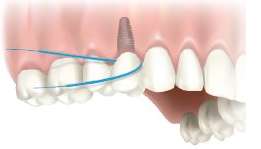 Good oral hygiene is essential for the 'health' of your implants, and plaque control is a critical component of your daily care.
Poor oral hygiene is a common reason why some implants fail after a few years.
Although the materials of dental implants are not susceptible to tooth decay, dental plaque can still damage the surrounding tissues.
If dental plaque is not removed at least every 12 hours with regular brushing and flossing to avoid potential periodontal disease, the accumulation of tooth plaque may lead to infection of the bone around the implant.
The condition is known as peri-implantitis and it is a common reason of implant failures.
Good oral hygiene is essential for the 'health' of your implants, and plaque control is a critical component of your daily care.
Poor oral hygiene is a common reason why some implants fail after a few years.
Although the materials of dental implants are not susceptible to tooth decay, dental plaque can still damage the surrounding tissues.
If dental plaque is not removed at least every 12 hours with regular brushing and flossing to avoid potential periodontal disease, the accumulation of tooth plaque may lead to infection of the bone around the implant.
The condition is known as peri-implantitis and it is a common reason of implant failures.Depending on the complexity of your dental restoration, you may be asked to use special oral hygiene products such as inter-dental brushes and oral irrigation devices. They can help remove dental plaque and food debris from under implant supported bridges or dentures. Your dentist or hygienist will also demonstrate how to use them so that you can become familiar with the devices that are required for daily dental hygiene care.
Be careful when flossing around implants.
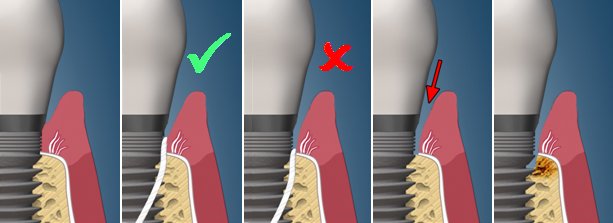 Gums attach to natural teeth with a very strong ligament that also has nerves.
So when you floss, this periodontal ligament will stop you from damaging the area and the nerves will create pain to stop you from damage.
But the attachment of gums to implants is much weaker and there are no nerves to warn you from going too deep.
If you put excessive force when flossing, the floss can damage this attachement and go deeper, exposing the bone around the implant to the mouth bacteria.
This could cause infection, bone loss around it and finally loss of the implant.
Gums attach to natural teeth with a very strong ligament that also has nerves.
So when you floss, this periodontal ligament will stop you from damaging the area and the nerves will create pain to stop you from damage.
But the attachment of gums to implants is much weaker and there are no nerves to warn you from going too deep.
If you put excessive force when flossing, the floss can damage this attachement and go deeper, exposing the bone around the implant to the mouth bacteria.
This could cause infection, bone loss around it and finally loss of the implant.
Avoid excesive temperature changes.
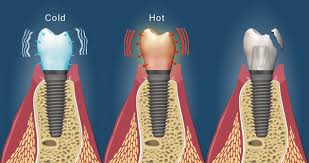 The porcelain that covers the crown on your dental implant expands with heat and contracts with cold.
So if you are eating something very hot and then you drink something very cold, the sudden temperature change may cause a crack to the porcelain crown.
Avoid very hot foods and drinks because the metal body of the implants transfers much more heat to the jaw bone than a natural tooth.
This could damage the bone cells around it and lead to bone loss.
The porcelain that covers the crown on your dental implant expands with heat and contracts with cold.
So if you are eating something very hot and then you drink something very cold, the sudden temperature change may cause a crack to the porcelain crown.
Avoid very hot foods and drinks because the metal body of the implants transfers much more heat to the jaw bone than a natural tooth.
This could damage the bone cells around it and lead to bone loss.
Avoid Vibrating Electric Toothbrushes.
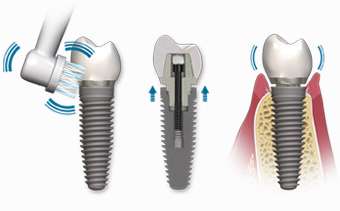 When you use a vibrating electric toothbrush, it creates vibrations that may loosen the internal screw that attaches the abutment and crown to the implant.
The crown will become loose. There is no way to tighten the screw without removing the crown as it is cemented on top of the post which covers the screw.
It is very difficult to separate all the parts in order to tighten the screw and many times the crown will need to be replaced at a significant cost.
When you use a vibrating electric toothbrush, it creates vibrations that may loosen the internal screw that attaches the abutment and crown to the implant.
The crown will become loose. There is no way to tighten the screw without removing the crown as it is cemented on top of the post which covers the screw.
It is very difficult to separate all the parts in order to tighten the screw and many times the crown will need to be replaced at a significant cost.
Regular dental visits and check-ups are also important for the early detection of any dental problems. Your dentist will suggest a suitable visit schedule for you based upon your individual needs, usually on a 3 month basis for the first 1-2 years, and every 6 months later on.
Special instructions may be needed if your dental implants will be used to support a removable denture. Be sure that you have well understand how to place and remove your denture without damaging the denture or implants.
The restorations the crown part of the missing tooth are not as strong as natural teeth. Avoid applying excessive pressure or eating hard foods to prevent braking the restoration or implant.
Stop habits such as teeth grinding and clenching because it can damage the crown but also cause inflammation of the implant area and lead to failure.
next page -> Success / Failure Rate of Dental Implants | Causes of Dental Implant Failure



